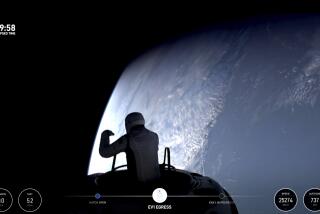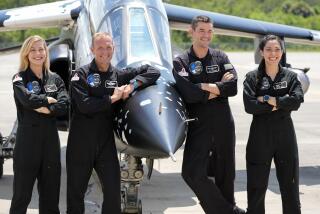Millionaire ‘Space Tourist’ and Comrades Soar Into Orbit
KOROLYOV, Russia — With a smile and a wave, Los Angeles multimillionaire Dennis Tito rocketed into the heavens Saturday in a flawless launch from the Baikonur cosmodrome that officially made him the world’s first “space tourist.”
As the Soyuz rocket in which he was strapped spewed fire and began to climb slowly skyward, Tito calmly checked his watch and a sheet of launch instructions and occasionally waved again at the cockpit camera.
A few minutes into the launch, a mission control officer asked the investment fund manager in accented English how he was feeling.
“Khorosho,” Tito replied with gusto--Russian for “good.”
Tito is the first American to go into space without the support of NASA--indeed, the American space agency vehemently opposed his trip, arguing that it would be foolhardy to launch an amateur cosmonaut to the International Space Station, or ISS, while it is still under construction.
But for the Russians, paying passengers such as Tito might represent the future. With government funding eroded by the collapse of the Soviet Union, the $20 million that Tito is paying will not only cover the costs of the launch but also leave plenty to spare.
As the Soyuz spacecraft reached orbiting altitude about 10 minutes after its 11:37 a.m. launch (12:37 a.m. PST), a jocular shout came from the VIP gallery at Russian mission control in Korolyov, outside Moscow.
“Dengi davai,” the voice called out, prompting titters from the gallery and controllers on the floor: “Pay up.”
If all goes as planned, the Soyuz is scheduled to dock with the space station Monday. The mission is scheduled to return to Earth on May 6.
Tito agreed a year ago to pay $20 million to the Russians for a round trip to the Mir space station. But when Russia was forced to ditch the trouble-prone station in March, the Russians offered a trip to the new ISS instead.
On Saturday, Russian space officials expressed irritation with NASA’s opposition, saying the Americans are treating them as second-class citizens on the space station.
“This happy moment is marred by the unconstructive attitude of our American partners,” said Yuri I. Grigoryev, deputy general designer of Energiya Corp., which built Russia’s space station modules. “For the last seven years, our experts have trained five generations of young American specialists in this sphere. And now we are getting this ingratitude and arrogance, as if they are masters of the station and we are just technical servants who should stand at attention and listen to their commands.”
Grigoryev added that the Russian space program intends to court more customers.
“There are a lot of rich people around,” he said. “Why shouldn’t they go flying, enjoy themselves and help the station at the same time?”
Tito--who worked his way up from immigrant Italian roots to become one of the biggest pension fund managers in the United States--insists that more than his money qualified him for the trip. He was an aerospace engineer before he went into the investment business, and he has spent the last eight months in training at Russia’s cosmonaut center outside Moscow.
“The training is tough,” Tito told reporters at the Baikonur launch center in Kazakhstan on Friday as he made final preparations. “And it was made more difficult by political problems.”
The official objective of the mission is to exchange the space station’s escape modules. The service life of the current escape craft, Soyuz TM-31, expires at the end of the month. Tito’s teammates are piloting up the new one, Soyuz TM-32, and will use the older craft to return to Earth.
Since only two cosmonauts are needed for the mission, the Russians sold the capsule’s third seat to Tito. On the official program, he is listed as a “participant” in the mission and a “systems operator”--meaning he has been trained to operate life support systems.
Until the final hours before the launch, trouble in the station’s American sector threatened to postpone it.
NASA asked the Russians to delay the mission by a day to permit more time for the crew of the space shuttle Endeavour, which is already docked at the station, to repair three computers that went out of order Tuesday. The Soyuz would have to pass within 20 feet of the shuttle to dock, which NASA considers too close for comfort.
However, the two sides reached a compromise early Saturday: The Russians would launch the new Soyuz on time but keep it in orbit for an extra day or possibly two until Endeavour undocks. The Soyuz has fuel and supplies for four days.
“This dictatorial pressure on us to postpone our flight was inexplicable and uncalled for, especially at a time when the ship was already standing on the launching pad filled up with fuel,” Grigoryev said. “Postponing the flight in such a situation would be very undesirable and even risky. I am absolutely sure that there is no reason that could prevent the shuttle from undocking and giving us a place to dock. And I hope we will be on schedule.”
For the most part, though, the atmosphere at Russian mission control was lighthearted. Boris Chertok, 89, a close associate of the father of Russia’s space program, Sergei P. Korolyov, hailed Tito’s flight as a new stage in space exploration.
“All this talk that now is not the right time for space tourism is simple demagoguery,” Chertok said. “Now that the Cold War is over and the state can’t fund us the way it lavishly did all those years . . . space tourism is quite the right thing to do. I hope many other rich people will follow suit.
“Sergei Pavlovich Korolyov once said that a time would come soon when people could fly to space on a ticket they could get from their trade union,” Chertok added. “He was right. But of course he couldn’t have imagined this ticket would cost $20 million.”
*
Sergei L. Loiko of The Times’ Moscow Bureau contributed to this report.
More to Read
Sign up for Essential California
The most important California stories and recommendations in your inbox every morning.
You may occasionally receive promotional content from the Los Angeles Times.










